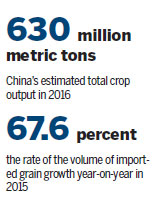Record high crop yields, but trade deficits continue
Updated: 2016-05-04 08:02
By Wang Yiqing(China Daily)
|
|||||||||
China's crop yields are expected to increase for the 13th consecutive year in 2016, but the agricultural products trade deficit, too, is likely to continue on the persistent price gap between imported and domestic products.
The analysis was included in an annual report, the Green Book of Rural Areas 2016, which was issued recently by the Rural Development Institute at the China Academy of Social Sciences.
According to the report, which analyzes and forecasts China's rural economy, the country's overall crop output is estimated to be 630 million metric tons this year, and follows a historical high of 621.44 million tons last year. The estimate is based on the current crop planting structure, the influence of agricultural policies and farmers' response to the market.
"We should insist on continuously strengthening China's agricultural productive capacity and adjusting the output and structure of agricultural products," said Fang Yan, deputy director of Rural Area Department, National Development and Reform Commission.
China plans to reduce corn planting on 10 million hectares through favorable policies in the sickle-shape major corn areas in the north, northeast, northwest and southwest. Even if the regulatory policies work completely, it seems unlikely to change the overall pattern of China's crop output considering the 1.7 billion hectare crop planting area nationwide.
If crop yields are reduced in some areas by weather or other natural calamities, there should still be a 1.5 percent increase in the year's crop output, considering the stable national crop purchasing price, low-cost agricultural production and a survey of farmers' planting attitudes.
"Continuous increases in crop outputs strongly guarantee people's livelihoods and stable consumption price levels," said Li Guoxiang, a researcher at the Rural Development Institute and one of the main authors of the report. "But it also brings the problems of imbalanced agricultural structure and high inventory of some crops, which poses challenges to the transformation of China's mode of agricultural development."
Despite the consecutive years of increasing domestic crop outputs, the trade deficit for China's agricultural products has continuously increased from 2006 to 2013, excepting the period of global financial crisis in 2009.
In the past 10 years, the average annual import growth of China's agricultural products has been about 20 percent, and the average export growth of China's agricultural products has been about 12 percent, said Xu Hongyuan, deputy director of the Center for the Promotion of Agricultural Trade at the Ministry of Agriculture.
"According to our calculation, imported agricultural products account for the output of one-third of China's overall planting area," Xu said.
"And China is the biggest importing country of soybeans, rice and barley, etc."
Although the trade deficit of China's agricultural products has shown a declining tendency since 2014, and the trade deficit was reduced by 8.7 percent to $46.2 billion last year, it is mainly because of the decline of global trade price, mainly the price of energy and resource products.
According to the report, China's international agricultural trade volume actually increased last year, even though the overall value declined. It was also noticeable that the volume of imported grain grew 67.6 percent year-on-year in 2015, despite the continuing growth in crop yields.
Therefore, as long as the global and domestic agricultural product market remains basically stable, the trade deficit of China's agricultural products will continue.
The major motivation for agricultural imports is the price gap between imported and domestic products.
The gloomy global economy has led to price declines for foreign agricultural products, while the price of domestic agricultural products has continuously increased. This is mainly due to low levels of scale and increasing costs of labor and land as China urbanizes.
As China's agricultural market becomes more and more open, the domestic agricultural industry will be more seriously affected and even challenged by the international agricultural market.
wangyiqing@chinadaily.com.cn

(China Daily 05/04/2016 page7)
Today's Top News
Buffett optimistic on China's economic transition
Hawking answers old Chinese philosophical question
Running the world
Getting back to basics
Alibaba denies reported takeover of AC Milan
China stresses Putin's expected visit
Russia launches rocket from Vostochny Cosmodrome
Record number of Chinese exhibitors at Spanish expo
Hot Topics
Lunar probe , China growth forecasts, Emission rules get tougher, China seen through 'colored lens', International board,
Editor's Picks

|

|

|

|

|

|







